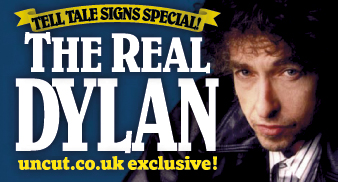BOB DYLAN SPECIAL: The Complete Tell Tale Signs In this month’s issue of Uncut, we celebrate the release of Tell Tale Signs, the Bootleg Series Vol 8, Bob Dylan’s astonishing 2 and 3CD collection of unreleased material from 1989-2006. We spoke to the musicians, producers and crew who worke...
BOB DYLAN SPECIAL: The Complete Tell Tale Signs
In this month’s issue of Uncut, we celebrate the release of Tell Tale Signs, the Bootleg Series Vol 8, Bob Dylan’s astonishing 2 and 3CD collection of unreleased material from 1989-2006.
We spoke to the musicians, producers and crew who worked with him during this period. And now, here’s your chance to read the full, unedited transcripts of those interviews.
Today, we present guitarist David Lindley‘s story about the making of Under The Red Sky, while Daniel Lanois, Jim Keltner and others will follow in a further seven parts in the next two weeks. .
You can read previous transcripts by clicking on the side panel (right).
Next one up Wednesday (October 15)!
***
DAVID LINDLEY
A guitarist sought out by Warren Zevon, Graham Nash, Ry Cooder and Curtis Mayfield, David Lindley was one of the ever-revolving cast assembled for 1990’s Under The Red Sky.
I had known Dylan from way back. I was called to be in his band at one time. Dylan was familiar with my stuff with Jackson [Browne] and Ry Cooder and I knew the man had ears. I mean, he listens to everything. On a musical basis, I had run into him here and there before. He was a big fan of [Lindley’s band] El Rayo-X and I remember him coming to one of the gigs we did in New York at a place called Sounds Of Brazil. He was a friend of Smitty [William Smith], the keyboard player, and was really into the band. So I got to talk to him. He was real personable. A lot of people get the impression he has a star complex, but he really doesn’t. He’s not like that at all. He’s just saving his energy for what he’s doing, because it’s like kung-fu, y’know. People come at him from all angles and directions and he has to deal with them. We’d talk about all sorts of things, mainly music and guitars: which ones sound good when you play them a certain way, which strings you use. He’s a big fan of the Teisco guitar. He actually used mine on one of the sessions and liked it a lot. The sound is way different from a Gibson or Fender. It’s more transparent and glassy, almost acoustic-sounding. And he particularly liked the nasty twang to it.
Under The Red Sky was big thing for me. I think they called me in because they didn’t want a stock guitar sound, or even a stock Lindley sound. Dylan would organise stuff in the studio as we were going along, as he heard certain things. He’d shuffle verses around a lot. It was amazing to watch him do it, quite a process. He was always working on stuff, organising verses and finishing things, changing words if he felt they worked better. And it was all done within the structure of what was going on. He was pretty impressive, shooting from the hip. Like Jackson Browne and Lowell George, he knew what he wanted in the studio. There would be basic chord charts and we’d go through them and explain things like tempo. Don Was, being a musician, would say things like “Well, it goes like this, but leave it open.” That wasn’t the case with every song. I remember a couple of songs being used as alternatives. I was mostly working on overdubs. The tracks would be laid down, then Jimmy Vaughan and I would put rhythm and slide over it. He was a fun guy to play with on songs like “Cat’s In The Well” and “10,000 Men”. Contrary to what people think, there weren’t a lot of takes of those songs. Both of the Vaughan brothers [Jimmy and Stevie Ray] were amazing to be with, both killer players.
There was always the freedom to bring your own ideas to the table. Dylan was very approachable in that respect. We’d talk in the studio. He’d say simple things like “I like that” and “Yeah, do that”. He’s kinda like Ry Cooder in that he does things the same way. With Dylan and Ry, it’s very much a case of “Do that”, “Don’t play there”, “Stop there”. But it wasn’t oppressive in any way, it was really fun. I mean, it was Dylan. C’mon! Then when things started to take form, Don would get more into specifics. He’d work with what was there, organise it then put it together. In the end, he’d just go “Fuck all that. Just play!” And it would always sound way better. It was get outta jail time.
I remember playing bouzouki, with Elton John on piano, on “2 X 2”, but there’s a lot of stuff I don’t remember about those sessions, if you know what I mean. And I haven’t heard those songs in a long time. But it was a case of me listening to the words to hear what Dylan was saying and thinking I should be careful in certain places. A lot of times I felt I should just not play at all and leave it sounding very spare. Don was always open for that. It was Dylan who was the ultimate authority, always. Don deferred to Dylan in that respect. But sometimes he would insist he was right, in a very nice way. On those occasions, Dylan would listen to it and then say “No no, I like my way of doing it.” But, y’know, they’re his tunes and he knew what kind of feeling he wanted them to ride out on.
ROB HUGHES



